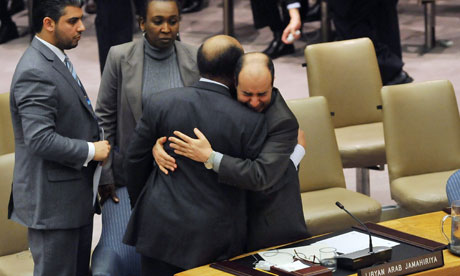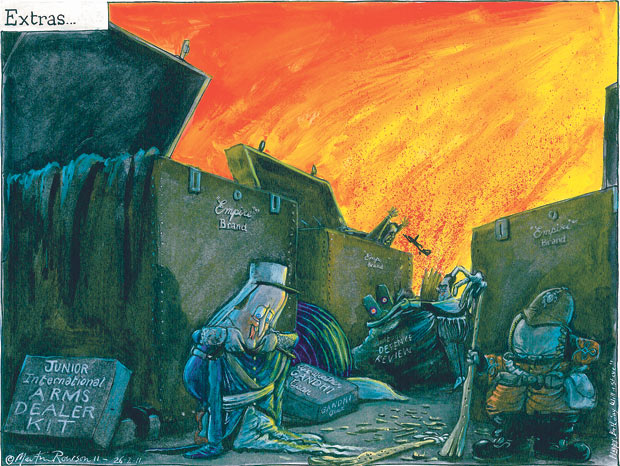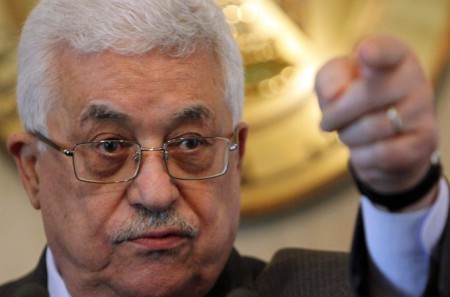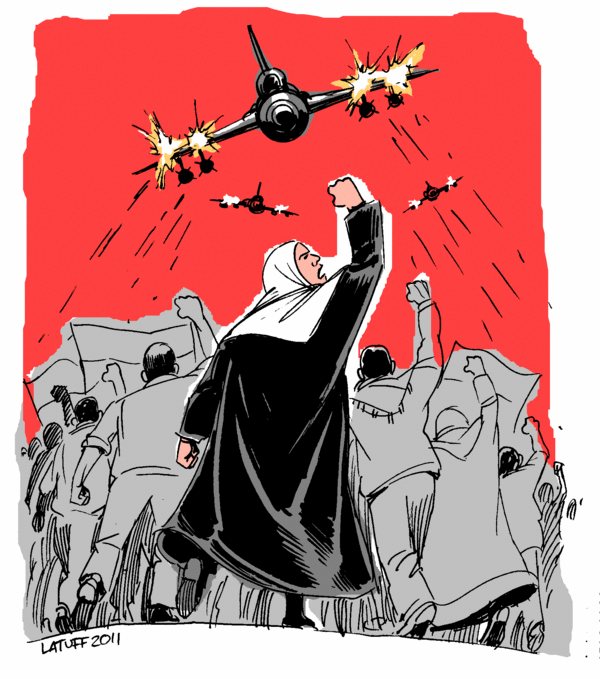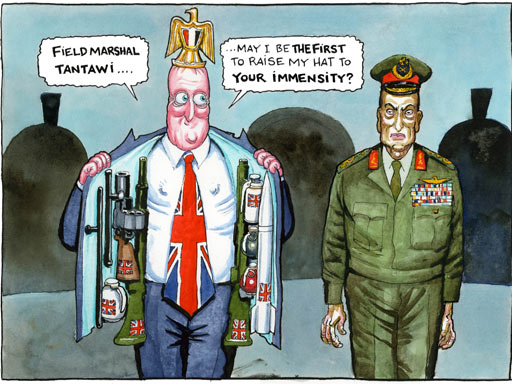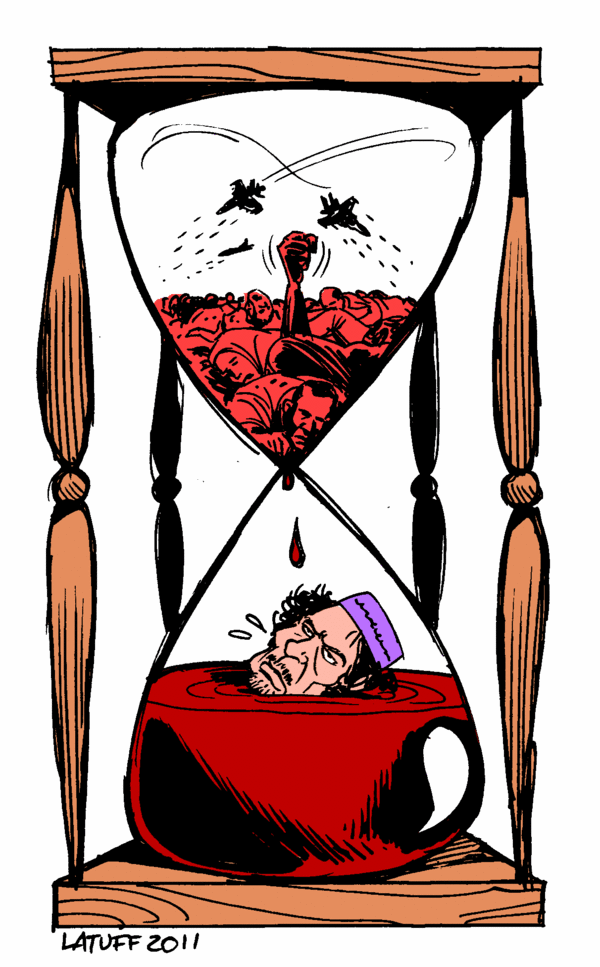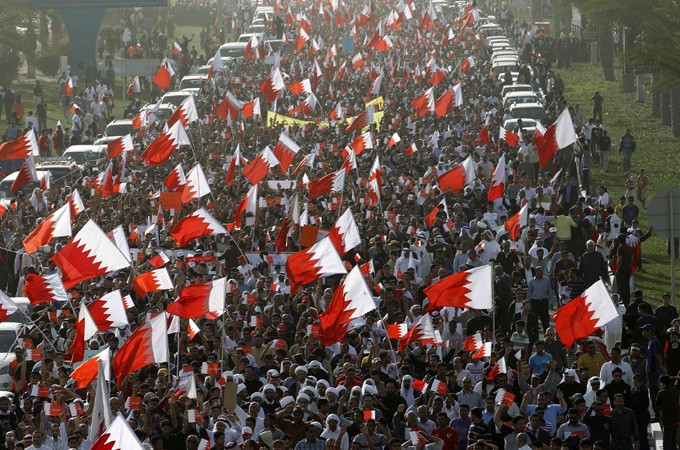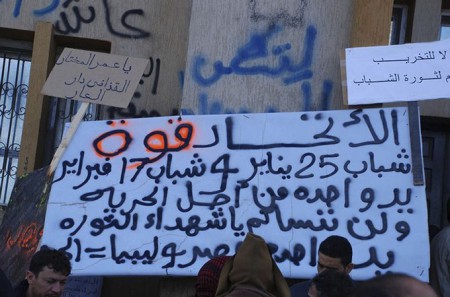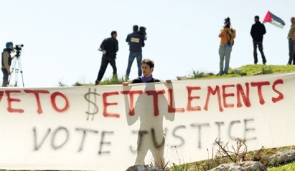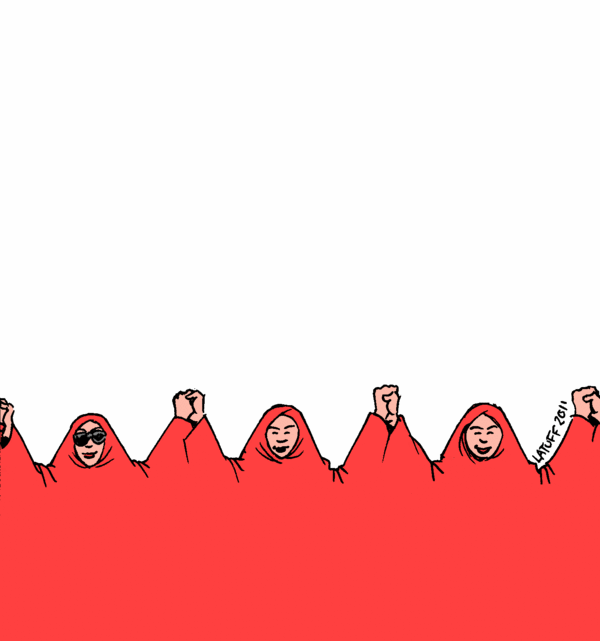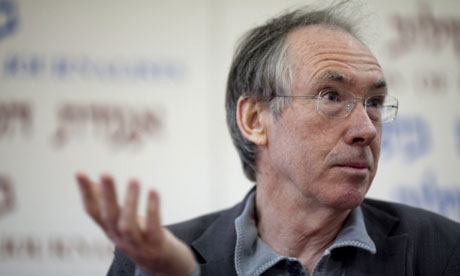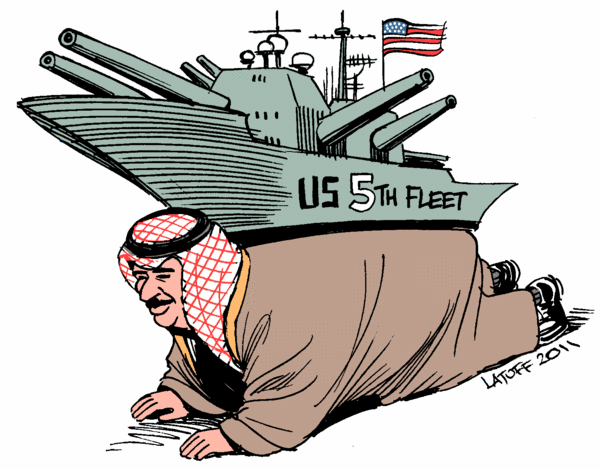EDITOR: panic stations in Jerusalem
With most of its strategic assets in the Middle East tottering or gone, the west is looking to secure the few left, and especially the Israel/Palestine ‘peace’, which is neither dead nor alive. The warmonger Tony Blair is leading this assault on the Palestinians, trying to get some movement before the Palestinian population joins the other Arab masses in revolt. It is also an attempt to prove to the other Arab nations that the west really cares about Palestine’s future… Fat chance of anything new coming out of this tired kitchen of lies.
Mideast Quartet due in Israel in bid to restart peace talks: Haaretz
Netanyahu refuses to send Israeli representatives to Quartet meeting in Brussels Wednesday, where they will meet with the Palestinians, so Quartet officials to come to Israel in compromise.
Mideast Quartet officials are due to arrive in Israel next week to meet with advisers of Prime Minister Benjamin Netanyahu in order to discuss new efforts to restart peace negotiations with the Palestinians.
On Wednesday, representatives of the Quartet of Middle East negotiators – the United States, United Nations, Russia, and European Union – will meet in Brussels in order to discuss possible steps to renew the peace process.
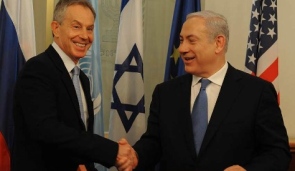
Israeli and Palestinian representatives were invited to the meeting, however Netanyahu decided not to cooperate and not send his adviser and peace talks representative Yitzhak Molcho to Brussels.
The Palestinians, however, have sent Saeb Erekat, who recently resigned from his position as chief Palestinian negotiator.
Netanyahu has voiced his reservations to the meeting, fearing that by agreeing he would open the door to international influence on the terms of the renewed talks.
Netanyahu told the Quartet members that he will only send his adviser Molcho if there would be a joint meeting between him and Erekat, but the Palestinians opposed the idea and demanded separate meetings.
Officials in the Prime Minister’s Office indicated that Netanyahu had been in contact with the U.S. administration in an attempt to find out the purpose of the Brussels session, and its purported goals, before making his final decision, but did not receive answers.
Netanyahu was about to announce that he plans to completely boycott the meeting, but at the end the sides arrived at a compromise wherein Quarter officials will arrive in Jerusalem next week and meet with Molcho. “At the moment we understood there will not be direct negotiations, we had no reason to fly there (Brussels),” said a source in the Prime Minister’s Office.
In two weeks, a meeting of foreign ministers of the Quartet will take place in Paris, where potential solutions to the core peace issues would be presented. The Russian foreign minister said Sunday that the purpose of the meeting will be to discuss the borders of a future Palestinian state and the security arrangements that Israel is demanding.
EDITOR: Al Araqib, the little symbol of Palestine, destroyed again
Read aout the 18th destruction of this village, by the combined Axis of Zionist evil: the IDF, the Jewish National Fund, and the God TV Channel. Could there be a more bizarre, more toxic combination? This Israeli answer to the regional uprising promises to deliver more anger and frustration about this colonial hub in the heart of the Arab world, continuing its poisonous work supported by Blair, Obama and Berlusconi.
The Israelis keep bulldozing their village, but still the Bedouin will not give up their land: The Guardian
The tiny village of al-Arakib has been torn down by the Israeli authorities 18 times in seven months, but each time the Bedouin rebuild their homes
Harriet Sherwood
The rutted track to al-Arakib leaves the desert highway at a sharp right angle through an unmarked gap in the roadside barrier. It’s easy to miss, to be swept past with the stream of traffic heading through the sun-hardened and windswept landscape of the Negev.
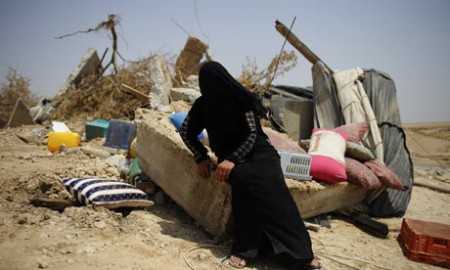
About a kilometre from the main road, you come first to the village cemetery, where the oldest grave dates from 1914, and a corrugated iron barn that serves as the mosque and now a communal kitchen and shelter. Then, across a trough in the land, you see the remnants of the Bedouin village: four simple wooden frames whose tarpaulin covers are continually thrashed by the relentless wind. This is all that’s left of a once-thriving community after a seven-month war of attrition that has pitted the Bedouin villagers against the Israeli army, the Jewish National Fund (JNF) and a Christian evangelical television channel called God TV. And the struggle is not over.
Since 27 July, the village has been demolished at least 18 times, most recently last Thursday. Each time the bulldozers and soldiers come at dawn to tear down the makeshift structures that have replaced the 40 concrete buildings that used to house the villagers, the men of al-Arakib rebuild them. Each time their footprint gets a little smaller.
Although the villagers say they have deeds to the land proving ownership since 1906, al-Arakib is “unrecognised” – meaning the state of Israel regards its very existence as illegitimate. Israel declared the land state property shortly after the 1948 war, and in recent years has accelerated efforts to drive the Bedouin into designated townships.
The villagers stand in the way of a government-backed JNF project to encourage Jewish settlement in the sparsely populated Negev and create a forest by planting half a million trees paid for by God TV. Launched in the UK in 1995 but now broadcasting globally from Jerusalem, God TV is part of a Christian Zionist movement that believes the Jews must return to the Holy Land as a pre-requisite of the Second Coming of Christ. In videos posted on its website, founder Rory Alec speaks of an “instruction from God” to “prepare the land for return of my Son”. He takes supporters to the Negev to plant saplings and urges others to make donations to fund the trees the TV channel has pledged to supply.
Afforestation has become a tool of the Judaisation of the Negev, says Oren Yiftachel, professor of political geography at the nearby Ben-Gurion University. The authorities have uprooted thousands of olive trees to replace them with “Jewish trees”. It’s only our trees that matter, he says wryly.
The new saplings, struggling to take root in the arid soil, are visible from the tent where Aziz Sayah Abu Mdagem sips sweet tea brewed in a blackened kettle over a kindling fire. This is our land, he says; we will not give it up. He describes the first demolition as a scene from a battlefield: hundreds of soldiers dragging screaming women and children from their homes before the bulldozers crushed the buildings. Special forces troops on horseback and on motorbikes surrounded the area as helicopters clattered overhead.
A shed housing the village’s chickens was flattened, killing all the birds inside. Trees – olive, citrus and almond – were uprooted. He shows us a collection of rubber bullets, tear gas canisters and spent stun grenades collected from successive demolitions.
Some of the traumatised children have been unable to speak since, he says. They wet their beds, they call out in their sleep. He shows a picture from an album of a pile of rubble. This, he says, is the children’s playground now. Later, he points to fresh furrows ploughed in the baked ground in preparation for tree-planting. “Every day they dig the land closer,” he says.
The JNF says its afforestation plan in the Negev is for the benefit of all inhabitants, but Abu Mdagem finds it hard to see how the destruction of their homes is a positive move for the Bedouin villagers. The JNF acknowledges the donation of trees from God TV but is reluctant to discuss the partnership.
God TV did not respond to a request for comment, but recently posted a message on its website, saying that claims that the evangelical channel is responsible for the displacement of the Bedouin people are false. It says its tree-planting endeavours, which are an “apostolic, prophetic act”, are simply part of “an effort to restore the desert places to the lush green land it once was, preparing the Holy Land for the return of the King of Kings”.
The struggle to save the village has won support from Jewish activists and intellectuals, including the celebrated Israeli novelist Amos Oz. Al-Arakib was, he said, a ticking time-bomb.
In the now near-deserted village, Abu Mdagem shows us the mosque, where mattresses are piled against one wall and cooking utensils line another. This is where the women and children of the village sleep at night, he says. He weaves through the stone-covered mounds in the adjacent cemetery to take us to the oldest grave, which, he says, proves their connection with the land.
During demolitions, the villagers seek refuge among the dead, believing the soldiers will not pursue them on to sacred ground. But recently even that has not proved safe, with shots and tear gas being fired into the cemetery.
“This is our life now,” Abu Mdagem says, threading prayer beads through his fingers. “We live together with the dead people in the cemetery.”
Israeli settlers hit back after army demolishes their West Bank homes: The Guardian
Call for a ‘day of rage’ as hardliners attack Palestinian villages and block roads in Jerusalem
Harriet Sherwood in Jerusalem
A Palestinian woman displays a burnt mattress and other damage allegedly caused by Jewish settlers after a petrol bomb was thrown into her house in the West Bank village of Hiwwara near Nablus. Photograph: Abed Omar Qusini/Reuters
Hardline Israeli settlers have called for a “day of rage” on Thursday in protest at the army’s demolition of an outpost in the West Bank. Settlers also launched attacks on Palestinian villages and blocked main roads in Jerusalem.
Havat Gilad, a hilltop settlement near Nablus built without government authorisation, was destroyed early on Monday, sparking clashes between activists and soldiers, in which the army fired rubber bullets and teargas canisters. The outpost’s occupants vowed to rebuild the settlement.
Later, hardline settlers burned tyres and blocked roads in Jerusalem and smashed the windscreens of Palestinian cars in the West Bank. Homes and cars in two Palestinian villages were attacked on Tuesday in what settlers described as “price tag” action in retaliation for Israeli government measures against settlements.
Flyers calling for further action on Thursday were distributed. They urged a “day of rage following the pogrom on Havat Gilad and the ongoing destruction on the hilltops … no more silence”.
Demolition of the outpost follows international pressure on the Israeli government to curb settlement building, to encourage a resumption of peace talks with the Palestinians. A UN security council resolution condemning settlements in the West Bank and East Jerusalem won the support of 14 out of 15 countries, including the UK. The US used its veto for the first time under President Barack Obama to block the resolution.
The Israeli government decided this week to dismantle all unauthorised outposts built on privately-owned Palestinian land, in a move which is likely to spark further clashes. However, it will simultaneously begin moves to make official unauthorised outposts built on West Bank land under Israeli control. All settlements in occupied territory are illegal under international law.
An Israeli soldier who lives at the Havat Gilad outpost held a press conference in Jerusalem to say that he would not return to military duty. “The [Israeli Defence Forces] sent troops to destroy my home and to shoot at my friends,” he said. “I do not intend to return to the army until I finish rebuilding the ruins.” The IDF said it viewed his actions as grave.
In whose name does Dutch FM Rosenthal speak?: The Electronic Intifada
Rifat Odeh Kassis, 1 March 2011
In recent months, a number of Latin American countries have publicly expressed their recognition of Palestinian statehood. Given that a Palestinian state doesn’t yet exist, this recognition also amounts to supporting the Palestinian right to statehood. For Israel and defenders of its policies around the world, the “snowball effect” of nations recognizing this right is, unsurprisingly, unnerving.
One such defender is Dutch Foreign Minister Uri Rosenthal. In an 8 February interview with The Jerusalem Post, Rosenthal argued why he believes international support for a Palestinian declaration of statehood “does no good” (“Dutch FM: Recognition of Palestinian state does no good”).
But what strikes me most about the interview is not the straightforwardness of his opposition. Rather, I am struck by what his opposition barely manages to mask: the hypocrisy of his rhetoric on “negotiations” and “democratic values;” a repressive attitude toward what he characterizes as “inflammatory language regarding Israel” within the EU; a betrayal both of the Netherlands’ strong record of commitment to international law and of his responsibilities as the representative of that commitment; and, ultimately, a glimpse of the hypocritical and increasingly repressive policies seen in the EU toward victims and critics of the State of Israel.
Part of what Rosenthal clearly opposes is a unilateral declaration of Palestinian statehood. Dutch policy is also changing along these lines: the Dutch parliament recently passed a resolution that calls for the government to oppose EU recognition of a Palestinian state. But Rosenthal doesn’t utter a word of objection to the unilateral steps taken by Israel.
Israel has illegally annexed East Jerusalem, demolished Palestinian homes there and elsewhere (and even entire towns — the military recently destroyed the Bedouin village of al-Araqib for the 18th time). It has confiscated vast amounts of Palestinian land to build its apartheid wall — the route of which was illegal in 2004 by the International Court of Justice in The Hague — and to protect terrain for illegal settlements. In violation of international law, it encourages its civilian population to inhabit those settlements (which have eaten away at more than 40 percent of the West Bank), practiced brutal detention policies, restricted freedom of movement and other fundamental liberties, tried children in military courts, put the Gaza Strip under a state of permanent siege and killed more than 1,400 Palestinians in Gaza (including 352 children) during its winter 2008-09 bombardment.
The list of unilateral acts — the list of crimes — goes on and on. Rosenthal claims to oppose decisions taken by governments without balanced, negotiated political processes. But if this were really true, he would understand the need to bring Israeli officials and military officers responsible for such crimes to the International Criminal Court in The Hague instead of defending
Israel’s actions in The Jerusalem Post.
Yet Rosenthal not only defends Israel in the Israeli press; he is also doing so under the auspices of, and with the responsibilities endowed to him by, his own parliament. Indeed, as The Jerusalem Post states, “Rosenthal, who is Jewish and married to an Israeli, was characterized recently by Czech Foreign Minister Karl Schwartzenberg as one of the two most active supporters of Israel among EU foreign ministers.” And he defines himself as “among the ones” in the EU who “regularly try to warn against unnecessary inflammatory language” and its “disproportionate” application to Israel. He recommends a “restrained attitude” to his EU partners when it comes to potential initiatives regarding the Palestinian-Israeli conflict; he staunchly disagrees with the suggestion that Israel’s image within the EU is “the lowest it has been in decades,” saying that there are many “balanced conclusions vis-a-vis the Middle East peace process.”
Such “restraint” not only condones policies that flagrantly violate international law and human rights, then, but also seeks to prohibit other EU countries from engaging in positive, proactive initiatives that might bring the conflict closer to an end. He is an influential proponent of the increasingly hypocritical EU stance on the Israeli occupation. This stance praises the meaningless concessions wrung out of diplomatic efforts (as Rosenthal praises Israel for becoming more “lenient” with respect to goods from Gaza, at the urging of the Dutch government) without recognizing that these band-aids only serve to prolong our occupation and subjugation.
Moreover, by defending Israel’s injustices through public office, Rosenthal thus makes his own country a partner in their perpetuation. The Dutch people are well-admired throughout the world as prioritizing human rights and international law; they, then, are being damaged and degraded by Rosenthal’s audacity. The Dutch people must know that their foreign minister is sacrificing the image of The Netherlands for the sake of Israel — that he is working hard to represent Israel’s interests while tarnishing those of his own country — and they should reject this insult, this injury.
While Rosenthal describes part of his work as to “warn” against “unnecessary inflammatory language” toward the Israeli state, this actually amounts to a justification of the government’s right to censor, repress criticism and create political blacklists. Rosenthal’s rhetoric and policies go hand-in-hand with those of Zionist lobbies like NGO Monitor and CIDI (The Center for Information and Documentation on Israel), which bully, harass and defame civil society groups exposing the truth about the Israeli occupation and human rights abuses. (It is worth mentioning that a CIDI board member, Doron Livnat, is the director of Riwal, a European company that produces access equipment and rents large-scale cranes for construction sites, and which has assisted in building the wall and illegal settlements in the occupied West Bank. Riwal’s headquarters in Dordrecht, Netherlands, was raided and searched by the Dutch National Crime Squad after Al-Haq, a Palestinian human rights group, levied criminal complaints against its activities.)
For instance, NGO Monitor recently slammed ICCO, a Dutch international development organization, for financing The Electronic Intifada. (ICCO is also under fire from CIDI for supporting the Olive Tree Campaign “Keep Hope Alive,” realized by the YMCA/YWCA Joint Advocacy Initiative. NGO Monitor vilified The Electronic Intifada and condemned ICCO by association. Rosenthal’s response? “I will look into the matter personally,” he said. If ICCO’s funding proves to be true, “it will have a serious problem with me,” he warned.
Is this the level that Rosenthal — not to mention the lobbies who share his tactics of finger-pointing, threats and repression — has stooped to? Persecuting organizations and publications that support human rights and social justice for Palestinians as “delegitimizing” and “anti-Semitic,” publicly smearing them and seeking to sabotage not only their work but also their rights to free speech and free press? This is an appalling position for a democratic representative to have, ostensibly part of an apparatus designed to uphold those rights in the first place.
These targeted campaigns led by European lobbies against Palestinian and Israeli nongovernmental organizations (NGOs), publications and advocacy groups are particularly chilling in light of similar campaigns being initiated in the Israeli Knesset: specifically, its moves to establish a committee for investigating the funding sources of certain (politically targeted) NGOs. In his interview with The Jerusalem Post, Rosenthal declined to comment on whether this initiative was “undemocratic,” saying “There is no reason to hide anything. I am in favor of transparency,” and “a vivid and lively civil society, where NGOs are a part of it, is very important.”
Rosenthal’s ongoing contradictions, and their echo within the policies of European governments, are astonishing. He claims to support transparency, not to mention the vividness and liveliness of civil society, while only acting repressively against groups and individuals he disagrees with. He says, free of irony, that the presence of NGOs in civil society is “very important,” when he supports a smear campaign against NGOs in his own civil society. And he praises the ideals of civil society itself while simultaneously practicing another campaign — silence — when it comes to Israel’s repression of the NGOs whose existence he finds so valuable in abstract.
Foreign Minister Rosenthal’s pronouncements on the Israeli government are so blind, so brazen, so hypocritical and so unjust that I am sometimes surprised he can utter them comfortably in his own name. But when we consider his vocal and prominent role in the parliament of his own country, and in the political arena of others’, it is especially important for all communities and individuals he attempts to represent (Jewish, Israeli, Dutch, European, etc.) to say loud and clear: “Not in our name.”
Rifat Kassis is International President of Defence for Children International (DCI) and General Director of its section in Palestine. He is also Coordinator and Spokesperson of Kairos Palestine – A Moment of Truth.
EDITOR: Israel is joining the regional wave of delusional leaders
The last few weeks have proven beyond any doubt that most of the rulers in the Middle East are not just brutal tyrants, but are also not connected to the real world, living in a separate, delusional layer of their own projections. Below is proof that Israel is part of this trend.
Deputy FM warns Islamist regimes could take over Arab world: Haaretz
Danny Ayalon warns that the anti-government uprisings in Arab countries could follow model of ‘Hamas in Gaza’ and ‘Hezbollah in Lebanon.’
Democratic uprisings that have already unseated long-standing autocrats in Tunisia and Egypt and are threatening to topple Moammar Gadhafi in Libya may be taken over by Islamist groups, Deputy Foreign Minister Danny Ayalon said Tuesday.
“The fear is that they will be hijacked, (following the) the model of Iran, the model of Hamas in Gaza, the model of Hezbollah in Lebanon,” Ayalon said during a visit to Brussels.
To stave off an Iran-like scenario, Ayalon urged the European Union and other international players to reach out to “genuine” pro- democracy groups, such as the January 25 movement that organized protests in Egypt.
Egypt’s largest opposition group, the Muslim Brotherhood, described his comments as “a blatant and clear event of interference in foreign affairs.”
Ayalon suggests “Israel would object to the Muslim Brotherhood being part of a future government and would work on banning the group from standing in any upcoming elections.”
In a statement on their website, the group also said it had “long renounced violence.”
The deputy FM said Israel would have no qualms with dealing with an Egyptian government supported by the Muslim Brotherhood, as long as the party renounced its radicalism.
“For us it is not a matter of titles, it is a matter of policies, and if the policies are peaceful policies, I think that we will welcome any Egyptian representative,” Ayalon said.
Ayalon, a former Israeli ambassador to the United States and foreign policy advisor to Prime Minister Benjamin Netanyahu, said the uprisings proved that the Arab-Israeli conflict was not the most serious issue for the region.
“The real major problem of the Middle East, which is now so glaringly evident, is the dysfunctionality of the Arab societies,” he said, pointing to unemployment, illiteracy, poverty, lack of female empowerment and “rights of any kind.”
Rebels form military council in Libya’s Benghazi: Ahram online
Anti-Gaddafi forces form military council in the East and defend city in the West. Int’l pressure steps up as Gaddafi plans more attacks, using elite squad
Defected Libyan soldiers stand guard with their weapons outside an army base in the eastern town of Ajdabiya, Libya, (AP).
Anti-regime leaders in Benghazi said Tuesday they have formed a military council in the eastern Libyan city which has become the hub of efforts to topple Moammar Gaddafi.
The council, comprising officers who joined protesters against Gaddafi’s rule, will liaise with similar groups in other freed cities in the east but it was not immediately clear if there were plans for a regional command.
“A military council was formed last night,” said Salwa Bughaighi, a member of a coalition of organisers who earlier this week set up a civilian council to run the city’s municipal affairs.
She said the list of members of the military committee had not yet been finalised but it did not include General Abdel Fatah Yunis, a former interior minister who sided with protesters in Benghazi.
The former minister gained respect among any protesters after he defected to their side during the fighting in Benghazi.
The council would liaise with similar organisations in other freed cities in the east, Bughaighi said.
Fathi Terbeel, a prominent lawyer who is also a member of the coalition, said there were still disputes over the membership of the council and added it was still unclear when a regional command would be established.
“There are still reservations over the names. The people are favouring officers who joined the revolution from the start and did not hesitate,” he said.
Gaddafi faces growing pressure both at home and from the West following a show of defiance by the veteran leader the US dubbed “delusional.”
Pro-Gaddafi loyalists tried to retake a key city near the capital overnight.
Government opponents in rebel-held Zawiya repelled an attempt by forces loyal to Muammar Gaddafi to retake the city closest to the capital in six hours of fighting overnight, witnesses said Tuesday.
The rebels, who include mutinous army forces, are armed with tanks, machine guns and anti-aircraft guns. They fought back pro-Gaddafi troops, armed with the same weapons, who attacked from six directions. There was no word on casualties in Zawiya, 30 miles (50 kilometers) west of Tripoli.
A similar attempt was made by pro-Gadhafi forces Monday night to retake the city of Misrata, Libya’s third-largest city 125 miles (200 kilometers) east of Tripoli. Rebel forces there repelled the attackers.
“We will not give up Zawiya at any price,” said one witness. “We know it is significant strategically. They will fight to get it, but we will not give up. We managed to defeat them because our spirits are high and their spirits are zero.”
Gaddafi, Libya’s ruler of 41 years, has already lost control of the eastern half of the country since protests demanding his ouster began two weeks ago. He still holds the capital Tripoli and nearby cities.
The witnesses said youths from Zawiya were stationed on the rooftops of high-rise buildings in the city to monitor the movements of the pro-Gaddafi forces and sound the warning if they though an attack was imminent. They also spoke about generous offers of cash by the regime for the rebels to hand control of the city back to authorities.
Gaddafi has launched the most brutal crackdown of any Arab regime facing a wave of anti-government uprisings spreading quickly around the Middle East. International pressure to end the crackdown has escalated dramatically in the past few days.
The US moved naval and air forces closer to Libya on Monday and said all options were open, including patrols of the North African nation’s skies to protect its citizens from their ruler.
France said it would fly aid to the opposition-controlled eastern half of the country. The European Union imposed an arms embargo and other sanctions, following the lead of the US and the UN. The EU was also considering the creation of a no-fly zone over Libya. And the US and Europe were freezing billions in Libya’s foreign assets.
“Gaddafi has lost the legitimacy to govern, and it is time for him to go without further violence or delay,” US Secretary of State Hillary Rodham Clinton said. “No option is off the table. That of course includes a no-fly zone,” she added. British Prime Minister David Cameron told lawmakers: “We do not in any way rule out the use of military assets” to deal with Gaddafi’s regime.
Gaddafi laughed off a question from ABC News about whether he would step down, as the Obama administration is demanding.
“My people love me. They would die for me,” he said. ABC reported that Gaddafi invited the United Nations or any other organisation to Libya on a fact-finding mission.
Gaddafi’s remarks were met with derision in Washington.
“It sounds, just frankly, delusional,” said US Ambassador to the UN Susan Rice. She added that Gaddafi’s behavior, including laughing on camera in TV interviews amid the chaos, “underscores how unfit he is to lead and how disconnected he is from reality.”
On Monday night, an Associated Press reporter saw a large, pro-Gaddafi force massed on the western edge of Zawiya, with about a dozen armored vehicles along with tanks and jeeps mounted with anti-aircraft guns.
An officer said they were from the elite Khamis Brigade, named after one of Gaddafi’s sons who commands it. US diplomats have said the brigade is the best-equipped force in Libya.
“We were able to repulse the attack. We damaged a tank with an RPG. The mercenaries fled after that,” said a resident, who spoke on condition of anonymity for fear of government reprisals.
He said Gaddafi called Zawiya’s influential tribal leader Mohammed al-Maktouf and warned him that if the rebels don’t leave the city’s main square by early Tuesday, they will be hit by warplanes. “We are expecting a major battle,” the resident said, adding that the rebels killed eight soldiers and mercenaries Monday.
Another resident of Zawiya said he heard gunfire well into the night on the outskirts of town.
In Misrata, pro-Gadhafi troops who control part of an air base on the city’s outskirts tried to advance Monday. But they were repulsed by opposition forces, who included residents with automatic weapons and defected army units allied with them, one of the opposition fighters said.
No casualties were reported and the fighter claimed that his side had captured eight soldiers, including a senior officer.
The opposition controls most of the air base, and the fighter said dozens of anti-Gaddafi gunmen have arrived from farther east in recent days as reinforcements.
An Empire of Lies: Counterpunch
Why Our Media Betray Us
By JONATHAN COOK, February 28, 2011
Last week the Guardian, Britain’s main liberal newspaper, ran an exclusive report on the belated confessions of an Iraqi exile, Rafeed al-Janabi, codenamed “Curveball” by the CIA. Eight years ago, Janabi played a key behind-the-scenes role — if an inadvertent one — in making possible the US invasion of Iraq. His testimony bolstered claims by the Bush administration that Iraq’s president, Saddam Hussein, had developed an advanced programme producing weapons of mass destruction.
Curveball’s account included the details of mobile biological weapons trucks presented by Colin Powell, the US Secretary of State, to the United Nations in early 2003. Powell’s apparently compelling case on WMD was used to justify the US attack on Iraq a few weeks later.
Eight years on, Curveball revealed to the Guardian that he had fabricated the story of Saddam’s WMD back in 2000, shortly after his arrival in Germany seeking asylum. He told the paper he had lied to German intelligence in the hope his testimony might help topple Saddam, though it seems more likely he simply wanted to ensure his asylum case was taken more seriously.
For the careful reader — and I stress the word careful — several disturbing facts emerged from the report.
One was that the German authorities had quickly proven his account of Iraq’s WMD to be false. Both German and British intelligence had travelled to Dubai to meet Bassil Latif, his former boss at Iraq’s Military Industries Commission. Dr Latif had proven that Curveball’s claims could not be true. The German authorities quickly lost interest in Janabi and he was not interviewed again until late 2002, when it became more pressing for the US to make a convincing case for an attack on Iraq.
Another interesting disclosure was that, despite the vital need to get straight all the facts about Curveball’s testimony — given the stakes involved in launching a pre-emptive strike against another sovereign state — the Americans never bothered to interview Curveball themselves.
A third revelation was that the CIA’s head of operations in Europe, Tyler Drumheller, passed on warnings from German intelligence that they considered Curveball’s testimony to be highly dubious. The head of the CIA, George Tenet, simply ignored the advice.
With Curveball’s admission in mind, as well as these other facts from the story, we can draw some obvious conclusions — conclusions confirmed by subsequent developments.
Lacking both grounds in international law and the backing of major allies, the Bush administration desperately needed Janabi’s story about WMD, however discredited it was, to justify its military plans for Iraq. The White House did not interview Curveball because they knew his account of Saddam’s WMD programme was made up. His story would unravel under scrutiny; better to leave Washington with the option of “plausible deniability”.
Nonetheless, Janabi’s falsified account was vitally useful: for much of the American public, it added a veneer of credibility to the implausible case that Saddam was a danger to the world; it helped fortify wavering allies facing their own doubting publics; and it brought on board Colin Powell, a former general seen as the main voice of reason in the administration.
In other words, Bush’s White House used Curveball to breathe life into its mythological story about Saddam’s threat to world peace.
So how did the Guardian, a bastion of liberal journalism, present its exclusive on the most controversial episode in recent American foreign policy?
Here is its headline: “How US was duped by Iraqi fantasist looking to topple Saddam”.
Did the headline-writer misunderstand the story as written by the paper’s reporters? No, the headline neatly encapsulated its message. In the text, we are told Powell’s presentation to the UN “revealed that the Bush administration’s hawkish decisionmakers had swallowed” Curveball’s account. At another point, we are told Janabi “pulled off one of the greatest confidence tricks in the history of modern intelligence”. And that: “His critics — who are many and powerful — say the cost of his deception is too difficult to estimate.”
In other words, the Guardian assumed, despite all the evidence uncovered in its own research, that Curveball misled the Bush administration into making a disastrous miscalculation. On this view, the White House was the real victim of Curveball’s lies, not the Iraqi people — more than a million of whom are dead as a result of the invasion, according to the best available figures, and four million of whom have been forced into exile.
There is nothing exceptional about this example. I chose it because it relates to an event of continuing and momentous significance.
Unfortunately, there is something depressingly familiar about this kind of reporting, even in the West’s main liberal publications. Contrary to its avowed aim, mainstream journalism invariably diminishes the impact of new events when they threaten powerful elites.
We will examine why in a minute. But first let us consider what, or who, constitutes “empire” today? Certainly, in its most symbolic form, it can be identified as the US government and its army, comprising the world’s sole superpower.
Traditionally, empires have been defined narrowly, in terms of a strong nation-state that successfully expands its sphere of influence and power to other territories. Empire’s aim is to make those territories dependent, and then either exploit their resources in the case of poorly developed countries, or, with more developed countries, turn them into new markets for its surplus goods. It is in this latter sense that the American empire has often been able to claim that it is a force for global good, helping to spread freedom and the benefits of consumer culture.
Empire achieves its aims in different ways: through force, such as conquest, when dealing with populations resistant to the theft of their resources; and more subtly through political and economic interference, persuasion and mind-control when it wants to create new markets. However it works, the aim is to create a sense in the dependent territories that their interests and fates are bound to those of empire.
In our globalised world, the question of who is at the centre of empire is much less clear than it once was. The US government is today less the heart of empire than its enabler. What were until recently the arms of empire, especially the financial and military industries, have become a transnational imperial elite whose interests are not bound by borders and whose powers largely evade legislative and moral controls.
Israel’s leadership, we should note, as well its elite supporters around the world — including the Zionist lobbies, the arms manufacturers and Western militaries, and to a degree even the crumbling Arab tyrannies of the Middle East — are an integral element in that transnational elite.
The imperial elites’ success depends to a large extent on a shared belief among the western public both that “we” need them to secure our livelihoods and security and that at the same time we are really their masters. Some of the necessary illusions perpetuated by the transnational elites include:
— That we elect governments whose job is to restrain the corporations;
— That we, in particular, and the global workforce in general are the chief beneficiaries of the corporations’ wealth creation;
— That the corporations and the ideology that underpins them, global capitalism, are the only hope for freedom;
— That consumption is not only an expression of our freedom but also a major source of our happiness;
— That economic growth can be maintained indefinitely and at no long-term cost to the health of the planet;
— And that there are groups, called terrorists, who want to destroy this benevolent system of wealth creation and personal improvement.
These assumptions, however fanciful they may appear when subjected to scrutiny, are the ideological bedrock on which the narratives of our societies in the West are constructed and from which ultimately our sense of identity derives. This ideological system appears to us — and I am using “we” and “us” to refer to western publics only — to describe the natural order.
The job of sanctifying these assumptions — and ensuring they are not scrutinised — falls to our mainstream media. Western corporations own the media, and their advertising makes the industry profitable. In this sense, the media cannot fulfil the function of watchdog of power, because in fact it is power. It is the power of the globalised elite to control and limit the ideological and imaginative horizons of the media’s readers and viewers. It does so to ensure that imperial interests, which are synonymous with those of the corporations, are not threatened.
The Curveball story neatly illustrates the media’s role.
His confession has come too late — eight years too late, to be precise — to have any impact on the events that matter. As happens so often with important stories that challenge elite interests, the facts vitally needed to allow western publics to reach informed conclusions were not available when they were needed. In this case, Bush, Cheney and Rumsfeld are gone, as are their neoconservative advisers. Curveball’s story is now chiefly of interest to historians.
That last point is quite literally true. The Guardian’s revelations were of almost no concern to the US media, the supposed watchdog at the heart of the US empire. A search of the Lexis Nexis media database shows that Curveball’s admissions featured only in the New York Times, in a brief report on page 7, as well as in a news round-up in the Washington Times. The dozens of other major US newspapers, including the Washington Post, made no mention of it at all.
Instead, the main audience for the story outside the UK was the readers of India’s Hindu newspaper and the Khaleej Times.
But even the Guardian, often regarded as fearless in taking on powerful interests, packaged its report in such a way as to deprive Curveball’s confession of its true value. The facts were bled of their real significance. The presentation ensured that only the most aware readers would have understood that the US had not been duped by Curveball, but rather that the White House had exploited a “fantasist” — or desperate exile from a brutal regime, depending on how one looks at it — for its own illegal and immoral ends.
Why did the Guardian miss the main point in its own exclusive? The reason is that all our mainstream media, however liberal, take as their starting point the idea both that the West’s political culture is inherently benevolent and that it is morally superior to all existing, or conceivable, alternative systems.
In reporting and commentary, this is demonstrated most clearly in the idea that “our” leaders always act in good faith, whereas “their” leaders — those opposed to empire or its interests — are driven by base or evil motives.
It is in this way that official enemies, such as Saddam Hussein or Slobodan Milosevic, can be singled out as personifying the crazed or evil dictator — while other equally rogue regimes such as Saudi Arabia’s are described as “moderate” — opening the way for their countries to become targets of our own imperial strategies.
States selected for the “embrace” of empire are left with a stark choice: accept our terms of surrender and become an ally; or defy empire and face our wrath.
When the corporate elites trample on other peoples and states to advance their own selfish interests, such as in the invasion of Iraq to control its resources, our dominant media cannot allow its reporting to frame the events honestly. The continuing assumption in liberal commentary about the US attack on Iraq, for example, is that, once no WMD were found, the Bush administration remained to pursue a misguided effort to root out the terrorists, restore law and order, and spread democracy.
For the western media, our leaders make mistakes, they are naïve or even stupid, but they are never bad or evil. Our media do not call for Bush or Blair to be tried at the Hague as war criminals.
This, of course, does not mean that the western media is Pravda, the propaganda mouthpiece of the old Soviet empire. There are differences. Dissent is possible, though it must remain within the relatively narrow confines of “reasonable” debate, a spectrum of possible thought that accepts unreservedly the presumption that we are better, more moral, than them.
Similarly, journalists are rarely told — at least, not directly — what to write. The media have developed careful selection processes and hierarchies among their editorial staff — termed “filters” by media critics Ed Herman and Noam Chomsky — to ensure that dissenting or truly independent journalists do not reach positions of real influence.
There is, in other words, no simple party line. There are competing elites and corporations, and their voices are reflected in the narrow range of what we term commentary and opinion. Rather than being dictated to by party officials, as happened under the Soviet system, our journalists scramble for access, to be admitted into the ante-chambers of power. These privileges make careers but they come at a huge cost to the reporters’ independence.
Nonetheless, the range of what is permissible is slowly expanding — over the opposition of the elites and our mainstream TV and press. The reason is to be found in the new media, which is gradually eroding the monopoly long enjoyed by the corporate media to control the spread of information and popular ideas. Wikileaks is so far the most obvious, and impressive, outcome of that trend.
The consequences are already tangible across the Middle East, which has suffered disproportionately under the oppressive rule of empire. The upheavals as Arab publics struggle to shake off their tyrants are also stripping bare some of the illusions the western media have peddled to us. Empire, we have been told, wants democracy and freedom around the globe. And yet it is caught mute and impassive as the henchmen of empire unleash US-made weapons against their peoples who are demanding western-style freedoms.
An important question is: how will our media respond to this exposure, not just of our politicians’ hypocrisy but also of their own? They are already trying to co-opt the new media, including Wikileaks, but without real success. They are also starting to allow a wider range of debate, though still heavily constrained, than had been possible before.
The West’s version of glasnost is particularly obvious in the coverage of the problem closest to our hearts here in Palestine. What Israel terms a delegitimisation campaign is really the opening up — slightly — of the media landscape, to allow a little light where until recently darkness reigned.
This is an opportunity and one that we must nurture. We must demand of the corporate media more honesty; we must shame them by being better-informed than the hacks who recycle official press releases and clamour for access; and we must desert them, as is already happening, for better sources of information.
We have a window. And we must force it open before the elites of empire try to slam it shut.
This is the text of a talk entitled “Media as a Tool of Empire” delivered to Sabeel, the Ecumenical Liberation Theology Centre, at its eighth international conference in Bethlehem on Friday February 25.
Rebel-held city near Tripoli celebrates battle win: The Independent
Tuesday, 1 March 2011
Residents of the rebel-held city closest to Libya’s capital passed out sweets and cold drinks to fighters today and celebrated with a victory march after they managed to repel an overnight attack by pro-Gaddafi forces.
“Allahu Akbar (God is Great) for our victory,” residents of Zawiya chanted as they paraded through the city’s main square. Some carried on their shoulders an air force colonel they said had just defected to the rebels’ side.
Witnesses said pro-Gaddafi forces battled rebels for six hours overnight but could not retake control of the city 30 miles west of Tripoli. They said there the last of several assaults by the Gaddafi loyalists came at around 3am.
“We were worried about air raids but that did not happen,” said one resident.
The Zawiya rebels, who include mutinous army forces, are armed with tanks, machine guns and anti-aircraft guns. They fought back pro-Gaddafi troops, armed with the same weapons, who attacked from six directions. There was no word on casualties.
“We will not give up Zawiya at any price,” said one witness. “We know it is significant strategically. They will fight to get it, but we will not give up. We managed to defeat them because our spirits are high and their spirits are zero.”
The witnesses in Zawiya said youths from the city were stationed on the rooftops of high-rise buildings in the city to monitor the movements of the pro-Gaddafi forces and sound the warning if they though an attack was imminent. They also spoke about generous offers of cash by the regime for the rebels to hand control of the city back to authorities.
Since the revolt against Gaddafi’s 41-year-old rule began two weeks ago, his regime has launched the harshest crackdown in the Arab world where authoritarian rulers are facing an unprecedented wave of uprisings. Gaddafi has already lost control of the eastern half of the country and at least two cities close to the capital — Zawiya and Misrata. He still holds the capital Tripoli and other nearby cities.
The UN refugee agency UNHCR says more than 110,000 people, mainly foreign migrants, have fled Libya to neighbouring countries and thousands more are arriving at the borders.
International pressure to end the crackdown has escalated dramatically in the past few days. The US moved naval and air forces closer to Libya on Monday and said all options were open, including patrols of the North African nation’s skies to protect its citizens from their ruler. The Obama administration is demanding that Gaddafi relinquish power immediately.
France said it would fly aid to the opposition-controlled eastern half of the country. The European Union imposed an arms embargo and other sanctions, following the lead of the US and the UN The EU was also considering the creation of a no-fly zone over Libya. And the US and Europe were freezing billions in Libya’s foreign assets.
Pro-Gaddafi forces also tried on Monday night to retake opposition-held Misrata, Libya’s third-largest city 125 miles east of Tripoli. Rebel forces there also repelled the attackers.
In Misrata, pro-Gaddafi troops who control part of an air base on the city’s outskirts tried to advance on Monday. But they were repulsed by opposition forces, who included residents with automatic weapons and defected army units allied with them, one of the opposition fighters said.
No casualties were reported and the fighter claimed that his side had captured eight soldiers, including a senior officer.
The opposition controls most of the air base, and the fighter said dozens of anti-Gaddafi gunmen have arrived from farther east in recent days as reinforcements.
In Zawiya, an Associated Press reporter saw a large, pro-Gaddafi force massed on the western edge of the city on Monday night, with about a dozen armoured vehicles along with tanks and jeeps mounted with anti-aircraft guns.
An officer said they were from the elite Khamis Brigade, named after one of Gadhafi’s sons who commands it. US diplomats have said the brigade is the best-equipped force in Libya.
“We were able to repulse the attack. We damaged a tank with an RPG. The mercenaries fled after that,” said a resident, who spoke on condition of anonymity for fear of government reprisals.
He said Gaddafi called Zawiya’s influential tribal leader Mohammed al-Maktouf and had warned him that if the rebels don’t leave the city’s main square by early today, they will be hit by warplanes.
Residents of Tripoli said the city was calm today but that some residents were anxious over what is seen there as a growing chance of foreign intervention.
“People are worried about foreign intervention,” said one resident. “Many Libyans see this as a conspiracy that will lead into dividing Libya to an eastern and western sectors. There will be massacres.”
Today, Gaddafi’s regime sought to show that it was the country’s only legitimate authority and that it continued to feel compassion for areas in the east that fell under the control of its opponents.
A total of 18 trucks loaded with rice, wheat-flour, sugar and eggs left Tripoli for Benghazi, the country’s second largest city 620 miles east of the capital. Also in the convoy were two refrigerated cars carrying medical supplies.
The convoy was met with a small pro-Gaddafi demonstration as it made its way out of Tripoli. “God, Gaddafi, Libya and that’s it,” chanted the demonstrators.
“The state is very generous with the people,” said 22-year-old Ahmed Mahmoud as he watched the convoy.
In Benghazi, the epicentre of the opposition-controlled east, activists said they had no objection to the imposition of a no-fly zone over eastern Libya, but were divided whether to accept relief from the Gaddafi regime.
“Gaddafi’s air force is a serious threat to us,” said lawyer Nasser Bin Nour. “We will welcome a no-fly zone on Gaddafi’s warplanes over the whole of Libya. The only thing we object to is foreign troops on Libyan soil.” said Bin Nour, who said many in the city would not oppose shelling the positions of pro-Gaddafi forces by foreign warships or planes.
Another Benghazi activist, Najlaa al-Manqoush, echoed Bin Nour’s comments on foreign aid, but pointed out that accept the relief supplies sent today by the regime would help Gaddafi’s propaganda machine.
“We reject any attempt by the regime to beautify its image in the media,” she said. “We are much smarter than that. We accept all the aid they send us from friendly nations, but not from Gaddafi.”
